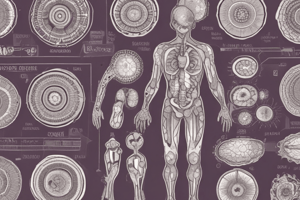Podcast
Questions and Answers
Which organ uses muscle tissue to pump blood?
Which organ uses muscle tissue to pump blood?
- Heart (correct)
- Lungs
- Kidneys
- Brain
What is the main function of the nervous system?
What is the main function of the nervous system?
- Supporting the body
- Secreting hormones
- Controlling and coordinating body functions (correct)
- Producing movement
Which organ system is responsible for regulating body temperature and pH balance?
Which organ system is responsible for regulating body temperature and pH balance?
- Respiratory
- Cardiovascular
- Endocrine (correct)
- Lymphatic
Which organ system includes the digestive tract and accessory organs?
Which organ system includes the digestive tract and accessory organs?
What is the process by which the body maintains a stable internal environment despite external changes?
What is the process by which the body maintains a stable internal environment despite external changes?
What is essential for maintaining life and health by helping the body adapt to changes in the environment?
What is essential for maintaining life and health by helping the body adapt to changes in the environment?
What is the main focus of human physiology?
What is the main focus of human physiology?
Which organelle is responsible for generating energy within the cell?
Which organelle is responsible for generating energy within the cell?
What is the main function of connective tissue in the body?
What is the main function of connective tissue in the body?
What is the fundamental unit of life?
What is the fundamental unit of life?
What is the main focus of physiology?
What is the main focus of physiology?
How does anatomy relate to physiology?
How does anatomy relate to physiology?
In what way does physiology contribute to industrial applications?
In what way does physiology contribute to industrial applications?
What is the primary responsibility of the heart in the body?
What is the primary responsibility of the heart in the body?
During which step of the heart's function is blood forced into the ventricles?
During which step of the heart's function is blood forced into the ventricles?
Which step of the heart's function involves the opening of the semilunar valves?
Which step of the heart's function involves the opening of the semilunar valves?
What is responsible for the transport of oxygen from the alveoli into the bloodstream?
What is responsible for the transport of oxygen from the alveoli into the bloodstream?
Which part of the lungs is responsible for gas exchange with the bloodstream?
Which part of the lungs is responsible for gas exchange with the bloodstream?
What creates a vacuum that pulls air into the lungs during inhalation?
What creates a vacuum that pulls air into the lungs during inhalation?
What is the function of the left side of the heart?
What is the function of the left side of the heart?
Flashcards are hidden until you start studying
Study Notes
Human Physiology
Human physiology is the scientific study of the processes and mechanisms that occur within the human body to maintain life and health. It involves understanding the structure and function of cells, tissues, organs, and systems within the body, as well as the interactions between these components. This article will explore the basics of human physiology, with a focus on the following subtopics:
- Structure and function of cells
- Tissues and organs
- Organ systems
- Homeostasis
Structure and Function of Cells
Cells are the fundamental units of life, and they make up all living organisms. They are the smallest unit that can perform all of the six functions of life, which include growth, reproduction, metabolism, responsiveness, and homeostasis. Cells have a membrane that encloses the cytoplasm and contains various organelles, which are specialized structures that perform specific functions. These organelles include the nucleus, mitochondria, and endoplasmic reticulum.
Tissues and Organs
Tissues are groups of cells that perform similar functions, while organs are groups of tissues that work together to perform specific tasks. There are four main types of tissues: epithelial, connective, muscle, and nervous. Each type of tissue has specific characteristics and functions:
- Epithelial: Covers and lines the body's surfaces and shapes organs and glands.
- Connective: Supports, connects, and protects other tissues.
- Muscle: Produces movement and supports the body.
- Nervous: Controls and coordinates body functions.
Organs are composed of different types of tissues that work together to perform specific functions. For example, the heart is an organ that uses muscle tissue to pump blood, while the brain is an organ that uses nervous tissue to control and coordinate body functions.
Organ Systems
Organ systems are groups of organs that work together to perform specific functions. There are 11 organ systems in the human body:
- Integumentary: Skin and its associated structures.
- Skeletal: Bones and cartilage.
- Muscular: Muscles.
- Nervous: Brain and nervous tissue.
- Endocrine: Glands that secrete hormones.
- Cardiovascular: Heart and blood vessels.
- Lymphatic: Lymphatic vessels and lymph nodes.
- Respiratory: Lungs and respiratory tract.
- Gastrointestinal: Digestive tract and accessory organs.
- Urinary: Kidneys, ureters, bladder, and urethra.
- Reproductive: Sex organs.
Each organ system has specific functions, and they work together to maintain the overall health and function of the body.
Homeostasis
Homeostasis is the process by which the body maintains a stable internal environment despite external changes. It involves various physiological processes, such as the regulation of body temperature, pH balance, and fluid balance. Homeostasis is essential for maintaining life and health, as it helps the body adapt to changes in the environment and maintain a stable state.
In conclusion, human physiology is a fascinating field that explores the structure and function of cells, tissues, organs, and organ systems in the human body. Understanding these components and their interactions is crucial for maintaining health and treating various diseases.
Studying That Suits You
Use AI to generate personalized quizzes and flashcards to suit your learning preferences.





